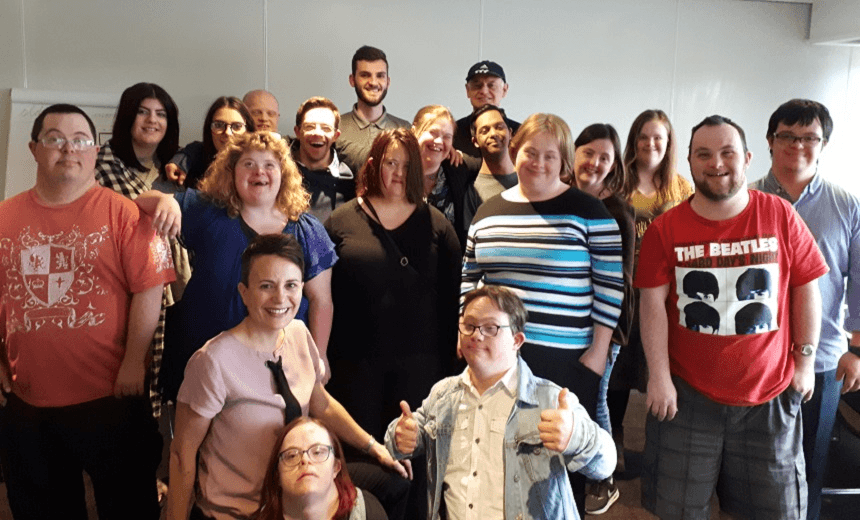New Zealand’s Disability Rights Commissioner Paula Tesoriero asks for attitudes toward disability to change and encourages the celebration of the lives and achievements of people with Down syndrome.
My time in the role as Disability Rights Commissioner has confirmed what I already knew: that attitudes towards disability in New Zealand need to change. And what better day to reflect on this than today, World Down Syndrome Day.
This year, people with Down syndrome are speaking out in a new campaign #WhatIBringToMyCommunity. It is a movement to empower people with Down syndrome to speak up, be heard, influence government policy and action and be fully included in the community.
As so many social movements have shown us, they need a ground swell of support to create impact. People with Down syndrome face numerous barriers in day-to-day life that will never be broken down without our full support.
It saddens me that we need this movement at all. We should all know that disabled people have value in their community.
Today, I want every New Zealander to stop and think about disability through a different lens than you might have previously. We need to challenge assumptions made and attitudes held about New Zealanders with disabilities.
People often think people with Down syndrome can’t work, live independently or be in a relationship. Many people with Down syndrome do all of these things. They have their own flats, they have partners, and jobs, and they run successful businesses. They have goals, challenges and aspirations, just like any person does.
Yes, they may have barriers that others don’t. But they face their challenges and keep pushing to achieve their goals and aspirations just like any other motivated person does.
People with Down syndrome make meaningful contributions throughout their lives, whether in schools, workplaces, living in the community, public and political life, culture, media, recreation, leisure, sport and in dance. But to ensure these options are available to them, support is needed.
Last weekend, one of my team visited a dance group in Palmerston North. Each of the 15 dancers have Down syndrome. The group was started by a young woman who wanted her sister to have the same opportunity to dance as she did. Ten years on, the dancers hold bi-annual sell out concerts. As I was being told about the group, one particular comment from a dancer called Lily struck a real chord with me:
“I feel like most people with disabilities are an outcast [in a play]. The others without disability are main parts. I think they should let us have a chance to do something that we want to do.”
“We should have a chance. They should be [cast as] an outcast and see how we feel.”
The New Zealand Down syndrome Association is launching a video today that aims to change these discriminatory attitudes.
“Dear Health Professionals” is a video that features 14 self-advocates from the Down syndrome community sharing a message.
Their message is simple: “We’re all different and unique, we all have value, and everyone has the right to live a happy and healthy life.”
It’s well-established that many people with intellectual disabilities, including Down syndrome, are still not getting their rights to health, education, and community living completely fulfilled. Their life expectancy is less, they struggle to get a fair deal at their local school, and despite the closing of residential institutions, many people do not get to choose where, how, and with whom, they live.
As a community, we need to reach out to our educators, employers, public authorities, media outlets and the wider community to bring about a change in attitudes. We need to ensure they all see the benefits of enabling people with Down syndrome to make meaningful contributions.
As Disability Rights Commissioner, I’m strongly focused on how we shift attitudes towards disabled people in New Zealand and part of that will be a social change campaign I am hoping to launch in the coming months. A campaign I’m keen for all New Zealanders to be a part of.
My view is that attitudes towards disabled people remain at best indifferent, and at worst, discriminatory. These attitudes underpin how disabled New Zealanders are treated and valued for their contribution to society.
The changing of attitudes towards disabled New Zealanders is so much more than just a “nice to do”.
Currently 42% of disabled young people aged between 15-24 are not engaged in education, employment or training and the unemployment rate of disabled people is twice that of non-disabled. Turning these statistics around is critical.
It is estimated that addressing accessibility barriers to employment would contribute $862m of GDP to New Zealand.
On World Down Syndrome Day, let’s celebrate the lives and achievements of people with Down syndrome and advocate for their rights, inclusion and wellbeing.
Let’s also acknowledge that if we all play our part in addressing underlying attitudes towards disability, we can change outcomes for disabled New Zealanders.
Paula Tesoriero is NZ’s Disability Rights Commissioner. It is her role to champion and protect the rights of disabled New Zealanders.
Follow the Spinoff Parents on Facebook and Twitter.
